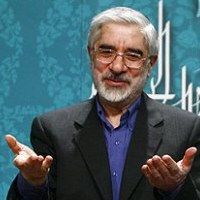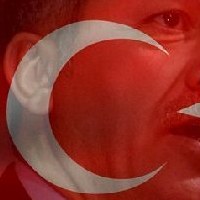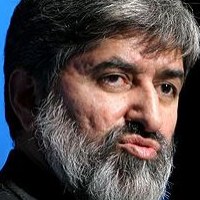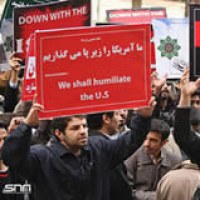![]()
Sun, Feb 20, 2011 | The Meir Amit Intelligence and Terrorism Information Center

Turkish President Abdullah Gul, who arrived in Tehran on Sunday for a four-day official visit, held a meeting with Supreme Leader of the Islamic Revolution Ayatollah Seyyed Ali Khamenei here on Tuesday noon. (Photos by leader.ir/Mehr News)
Different Voices in Iran over Rapprochement with Turkey as Turkish President visits Tehran
Turkey’s President Abdullah Gul held a two-day official visit to Iran with a delegation of ministers and businessmen. Iran’s media provided extensive coverage of Gul’s meetings in Iran and reported the intent of the two countries’ presidents to considerably expand the Iran-Turkey trade and economic ties in the coming years.
Alongside reports on opportunities to develop the economic ties between the two countries, some Iranian media also voiced concerns over Turkey’s intentions and attempts to take advantage of the opportunity to improve its regional status at Iran’s expense.
Asr-e Iran, a website affiliated with the pragmatic conservative bloc, claimed in an editorial that the change in Turkey’s policy towards Iran is primarily a result of Turkish political and economic interests. The authorities in Turkey are well aware of Iran’s economic strengths and weaknesses and seek to take advantage of them to improve their country’s economic situation. The website noted that the expansion of ties with Turkey may also prove beneficial for Iran. It can use Turkey as a mediator between Tehran and European commercial companies that have been forced to cut back on their activities in Iran due to the economic sanctions. Iran can also use its tightening relations with Turkey to claim that the sanctions policy has failed.
The website claimed, however, that Turkey has more to gain from a rapprochement with Iran. Turkey can become a substitute for the United Arab Emirates, whose status as a commercial mediator between Iran and European companies has been compromised as a result of American pressure; it can take advantage of the sanctions imposed on Iran to demand a more substantial reward for its willingness to expand trade relations with it; and it can use its expanding ties with Iran as a leverage vis-à-vis Western countries. The website expressed dissatisfaction with the fact that the Iranian people have to pay a high price to countries willing to serve as mediators between Iran and European countries. Funneling funds that should have remained in Iran’s treasury to its Arab neighbors is no different than funneling them to its Turkish neighbors, the website said (Asr-e Iran, February 15).
The economic daily Donya-ye Eqtesad (World of Economy) also addressed the Iran-Turkey rapprochement, mentioning that the long-standing relations between the two countries were not based solely on friendship but also on rivalry. An editorial published by the daily says that despite the political changes undergone by Turkey in recent years, it is attempting to maintain its relations with the West. The rise of Islam only further intensified the competition between the two countries, since Iran supports Islamic elements in the region out of ideological considerations and Turkey, too, now strives to defend the Muslims to strengthen its regional position. The daily pointed out some differences in the two countries’ outlooks, reflected also in the stance towards the latest developments in Egypt. Unlike Iran, which aspires to a regime change in Egypt, Turkey’s position was closer to that adopted by the West, which sought to retain Egypt’s political regime in its current form, only without Hosni Mubarak as leader (Donya-ye Eqtesad, February 15).
The Iranian Diplomacy website also discussed the regional and economic interests underlying Turkey’s foreign policy. In an interview given to the website by Dr. Bahram Amir Ahmadian, an expert on Turkish affairs from the University of Tehran, he said that Turkey is interested in strengthening its regional influence and expanding its relation with the countries of the region to entrench its position.
The expert said that Turkey played both sides of the fence in the Iran-Iraq War, maintaining close relations with both Iran and Iraq in an attempt to benefit from the conflict between its two neighbors. This time, he claimed, Turkey once again seeks to take advantage of the regional developments for its own interests, and it considers the sanctions imposed on Iran an economic opportunity to increase its investments in Iran (Diplomasi-ye Irani, February 13).
Implied criticism of the imbalance in Turkey-Iran relations was also made by Tehran Emrouz, a daily affiliated with Tehran’s mayor, Mohammad Baqer Qalibaf. An editorial published by the daily on the occasion of President Gul’s visit to Iran says that Iran and Turkey are natural partners in the region which can conduct strategic trade relations between them, similarly to the relations that developed between Germany and France after World War II.
The daily claimed, however, that such strategic relations require balance between the two countries. It is inconceivable that Iran should exchange its petrodollars for goods imported from Turkey. A trade balance between Iran and Turkey is a vital condition for the advancement of their relations, and as long as such balance has not been achieved their economic relations cannot become strategic (Tehran Emrouz, February 16).
Voices warning about the possibility that the improvement of Turkey’s status in the region may come at Iran’s expense were already heard in the past.



 RSS
RSS










Different Voices in #Iran over Rapprochement with #Turkey as Turkish President visits Tehran
| #Islamism http://j.mp/fjIEYi